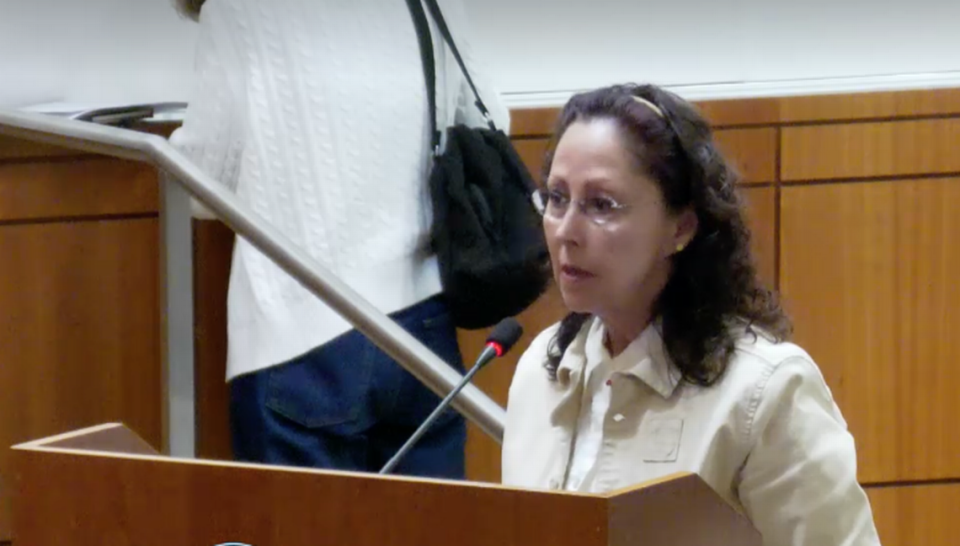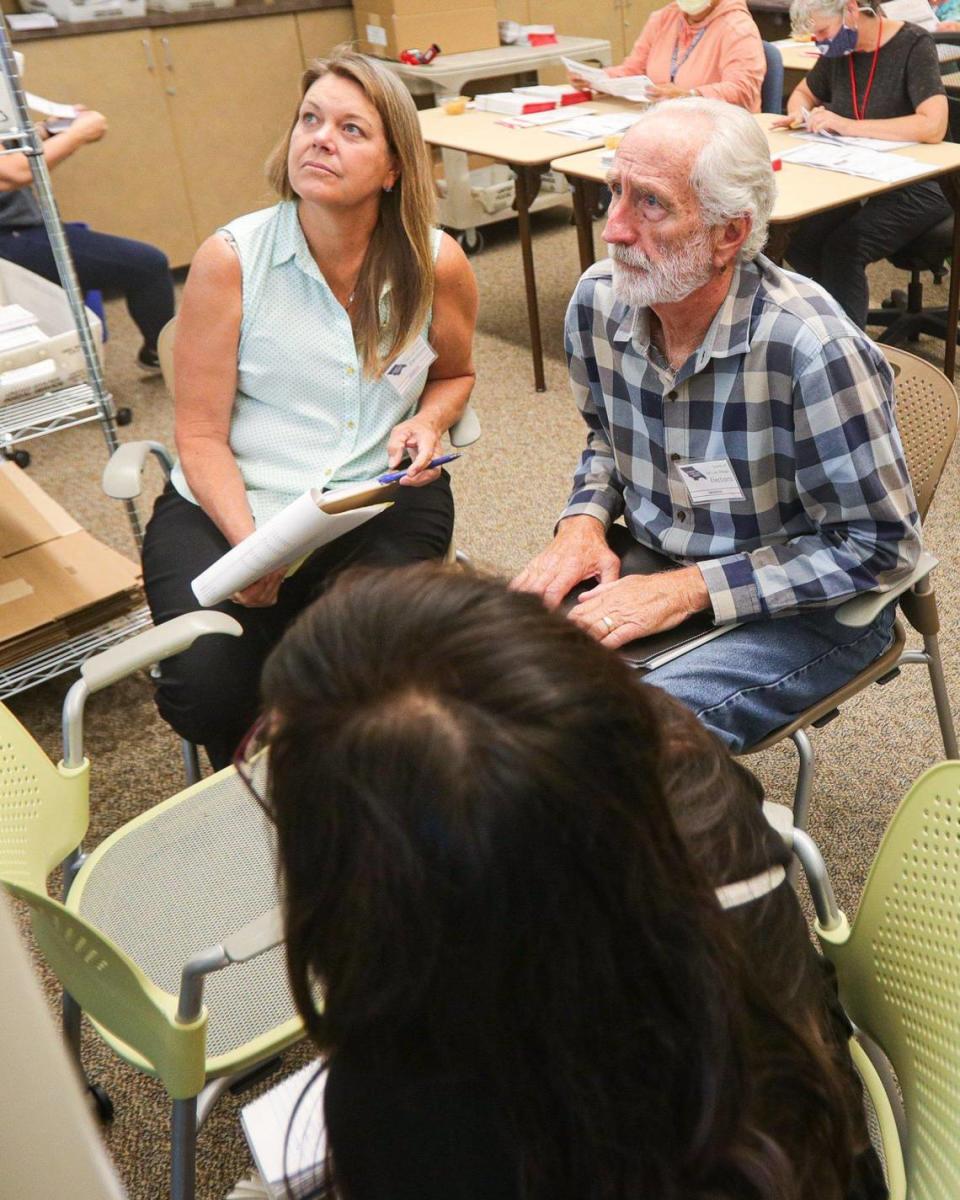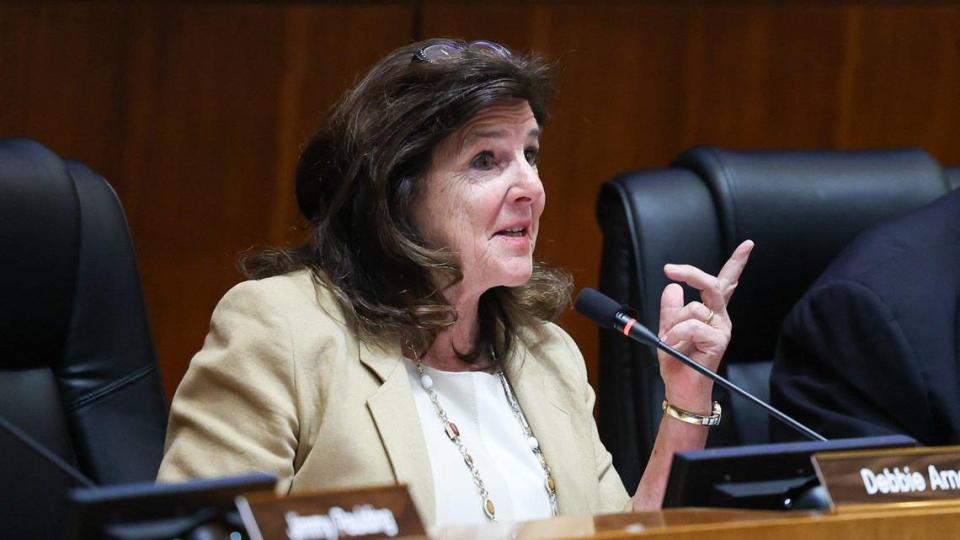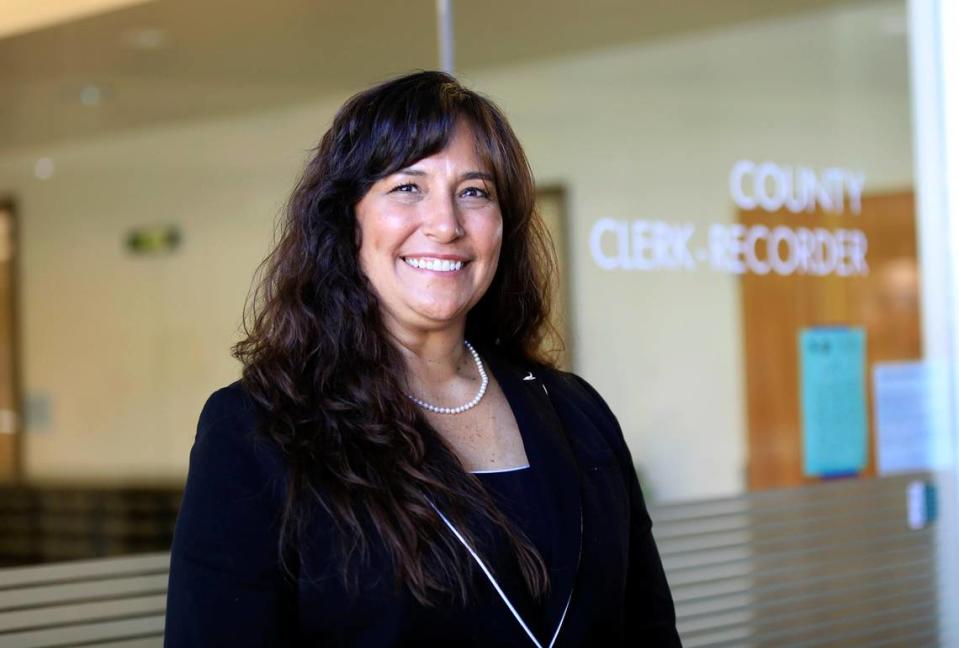How a SLO County meeting descended into misinformation — and why it’s dangerous
The agenda for a recent mid-summer San Luis Obispo County Board of Supervisors meeting was ripe for tension from the start, with two hot-button topics up for debate.
First, supervisors were set to revisit a motion to declare June as Pride Month.
Next up on the July 9 agenda was a vote on a new contract with Dominion Voting Systems, which provides ballot-counting machines for county elections.
The two unrelated topics actually had something in common in that they sequentially spun the meeting into the latest example of how a government forum can be overtaken by misinformation, sometimes to inappropriate extremes.
On this day, public comment lasted over an hour and a half. Of the residents who took the stand, the majority illustrated a penchant for spreading false stories.
Over the course of the meeting, around 16 people shared misinformation about Dominion Voting Systems linked to the denial of the results of the 2020 presidential election, and about a dozen others referenced conspiracy theories about the LGBTQ+ community.
As part of The Tribune’s Reality Check series, we took a step back to look at the claims that were made, the damage they present and how officials try to counter the spread of false information.
Speakers turn out to oppose to Pride Month declaration
The Pride Month discussion was back on the agenda after being postponed from an earlier meeting.
And in short order, it devolved from a simple vote on supporting a marginalized community into a presentation of explicit photos, videos and comments targeting LGBTQ+ people.
As part of a call for the Board of Supervisors to reject the Pride Month declaration, Arroyo Grande mayoral candidate Gaea Powell presented a video showing clips of naked men reportedly at a Pride event in San Francisco and elsewhere, graphic images of children receiving gender-affirming surgery, and cartoon images of children receiving oral sex that she said she found in the library of a local high school.
“If you’re offended with nudity or lewd acts, you should probably step away,” Powell said before playing the video.
The video was so long, Powell had to rely on following speakers to use their time to continue the display.
At times, members of the audience gasped at the graphic imagery, and Supervisor Jimmy Paulding interrupted the presentation to question the appropriateness of showing the video at a livestreamed public meeting.
“County counsel, if you want to pay attention, we’re seeing pornographic images, which perhaps run afoul of First Amendment Rights,” he said. “I do want to apologize to those in attendance and those at home.”
In defending the presentation, Powell told The Tribune in an interview that she first began to believe that educating children about transgender people was harmful when she attended a Board of Supervisors meeting a few years ago and heard someone give public comments about the subject.
She said she believes that if children are exposed to Pride celebrations or are taught about gender and sexuality diversity in schools or at community events, they will be more likely to consider themselves to be transgender.
“Teachers are conning these children into thinking they are trans,” Powell said. “The train is completely off the rails.”

Powell said that she supports transgender people over the age of 18 but said that there is “no such thing as a transgender child.”
She told The Tribune that she believes that by declaring June Pride month, SLO County is allowing children to be exposed to information about the LGBTQ+ community that will “confuse them.”
Going even further, Powell said that she believes schools having books that portray LGBTQ+ relationships are part of “psychological indoctrination” by the “communist state.” She told The Tribune that she felt books that portray straight sexual relationships should also be kept out of schools.
These kinds of claims, however, have been widely disproved by experts and those who work within the LGBTQ+ community.
Russ Toomey, a professor of family studies and human development at the University of Arizona, is one such expert.
He told The Tribune that the idea that educating children about transgender people will make children transgender is inherently flawed.
“We know that for millennia we have only been talking about cisgender experiences in schools, and yet a significant proportion of the U.S. identifies outside the gender binary,” Toomey said.
Toomey also said that the idea that children cannot be transgender is faulty and said that there is documented history of transgender people existing across cultures at many different ages.
“They document the history of transgender children throughout history in the United States, including children that socially transitioned in their schools and those that had medically affirming support even in the ‘30s, ‘40s and ‘50s in the United States,” Toomey said. “So trans kids are not a new phenomenon. They do exist.”
In a conversation with The Tribune, Director of Programming at the Gala Pride and Diversity Center Serrin Ruggles said that the misinformation being spread at meetings is nothing new but rather the latest in a decades-old cycle of false claims about the community that aims to inspire fear and anger.
Ruggles said that they see misinformation most often cropping up in conversations with parents of LGBTQ+ youth.
“If they have been fed this stream of disinformation, their first reaction when their child comes out to them is fear and anger,” Ruggles said. “Often when I get that first phone call, my first challenge is to get that parent to understand what is reality for their child.”
According to Ruggles, the spread of false ideas about the LGBTQ+ community has meant that their job now includes unpacking false ideas before they can begin to support families and youth.
They also said that when a child is met by fear and anger when they come out to their family, the risk of homelessness for LGBTQ+ teens increases — something they said the center has dealt with in SLO County.
Ruggles told The Tribune that the narrative about trans people being spread by people like Gaea Powell — that providing education about the trans community will confuse children, and that trans people are inherently predatory towards children — is not a new message.
They said that the same misinformation has been parroted over decades with the intent of ostracizing different groups. They said recently it has become less socially acceptable to be outwardly anti-gay, so now the same rhetoric that was once used against gay people is now being directed at the trans community.
“The needle has shifted a little more towards being anti-trans,” Ruggles said. “In the ‘70s, ‘80s and ‘90s what people were saying was that it was dangerous to leave children alone with gay people because all gay people were pedophiles, and now it’s the same thing, but they lean a little bit more towards transgender people.”
Ruggles said that when people like Powell who claim to be protecting children publicly display images of children’s genitalia, reality creates a stark contrast with rhetoric.
Misinformation about elections
Later in the day, the board turned to address its contract with Dominion Voting Systems, and several residents quickly voiced concerns about the integrity of SLO County elections regarding the processes used to tally votes and the security of Dominion’s equipment.
San Miguel resident Darcia Stebbens, a longtime critic of automated vote counting who has requested and paid for multiple recounts in recent years, opposed the contract with Dominion voting systems.

She has personally financed two recounts in the past two years, one for the June 2022 4th District Supervisor race between Lynn Compton and Jimmy Paulding and the other for the November 2022 2nd District Supervisor race between Bruce Jones and Bruce Gibson.
In an interview with The Tribune, Stebbens said that her opposition to Dominion Voting machines doesn’t qualify as misinformation.
Instead, she says she simply has concerns about Dominion machines that have gone unanswered by the Clerk-Recorder’s Office.
Stebbens claims that the county voter rolls cannot be verified and that the voting machines can be hacked or tampered with to disrupt the vote count.
However, public information specialist for the Clerk-Recorder’s Office Erin Clausen told The Tribune in an interview that because the machines are not connected to the internet, they cannot be hacked.
In recent elections, Stebbens also believes that dead people have been kept on the SLO County voter rolls, that people without citizenship have voted, and that some people have received more than one ballot.
Clerk-Recorder Elaina Cano rejected those claims.
Cano told The Tribune that the voter rolls in SLO County are maintained on a daily basis. People are removed based on information from the state health department, and new voter registrations are added to the rolls when people register.
Stebbens also said the use of voting machines changes the pattern of election returns and delays election results. She questioned whether delays in processing mail-in ballots was an indicator of fraudulent behavior.
However, Cano explained that the time it takes to process votes isn’t a sign of fraud but instead reflects the rise in popularity of mail-in balloting.
Cano said that the increasing use of vote-by-mail ballots has slowed the processing time because additional steps are taken to ensure the security of those ballots.
In public comment and in her conversation with The Tribune, Stebbens said that she was concerned that Dominion Voting machines also had the capacity to print voting ballots and that she thought the Clerk-Recorder’s Office might be using the machines to forge votes.
That simply is not true, Cano said.
“Some voting systems include ballot-marking devices that assist voters in marking their choices. These devices do not print ballots,” Cano said. “Instead, they mark a pre-printed ballot or produce a paper record of the voter’s selections for verification.”
Ultimately, the board approved the motions related to the Dominion machines, with all supervisors voting in favor of the contract except 5th District Supervisor Debbie Arnold.
But that doesn’t mean the suspicions will stop.
And sometimes, in fact, it’s political leaders themselves who contribute to the spread.
Supervisor denies spreading misinformation
Election security has been on Arnold’s radar for several years.
She told The Tribune in an interview on July 10 that she has been concerned about automated voting machines since the county first adopted them as part of its election process in 2018 and that her concerns about automated vote counting were only amplified by disputes surrounding the 2020 election.

Arnold said that prior to the county’s most recent contract negotiation with Dominion, she consulted with cybersecurity experts who she said were not able to completely reassure her that the machines could not be tampered with.
Clausen, the Clerk-Recorder’s Office representative, told The Tribune that this kind of approach leaves people — especially those who may not be the most versed in technology — reliant on sources who are don’t actually work with the specific machines used in their county or elections office.
This, Clausen said, could lead to people consuming or spreading inaccurate information.
Arnold says she does not see herself as spreading misinformation about the machines despite multiple reassurances from past and present SLO County clerk-recorders that the machines are safe, and despite the theories spread by former President Donald Trump being widely debunked to the extent Fox News lost a $787 million defamation settlement for false claims made against Dominion.
Instead, she says, she sees herself as “not a technology person” who is asking the same questions that citizens are posing in public comment.
Arnold said that opposition to Dominion Voting Machines is not her only criticism of the election process and that she has a number of other concerns, including the time that it takes for the county to post results.
Speaking to the Board of Supervisors on July 9, Cano said that SLO County election results are returned as fast as possible while abiding by normal working hours and holidays for election workers.
Cano again emphasized that the main reason that verified election results take a long time to produce is the wide-spread use of mail-in voting — which requires a longer process to tabulate.
Cano also noted that nearly 90 percent of voters in SLO County now use mail-in ballots to cast their votes.
Why does misinformation take root?
The two examples at the SLO County meeting raise a basic question: Why is misinformation being embraced so widely by some people?
For Cal Poly political science professor Michael Latner, the answer is simple: Conspiracy theories can give people a sense of control during times in their lives when they may feel vulnerable, unsure or scared.
Likewise, Karen Douglas, a conspiracy theory expert and professor of social psychology at Kent University in Canterbury, told The Tribune in a statement that people are attracted to conspiracy theories and susceptible to believing false information “when one or more psychological needs are frustrated.”
Douglas said this can look like a desire for an understanding of the truth and a feeling of insecurity or a lack of safety.
Latner said that conspiracy theories perfectly fit the needs of someone in the situations that Douglas described.
“The reason that it works is because it provides a collective identity,” he said. “People can project their own personal insecurities and dysfunction and the things that are going wrong in their life.”
People can then become prone to accepting far-fetched ideas.
“This perspective essentially means that anyone can fall into conspiracy theories if the circumstances are right,” Douglas said.
However, Latner noted, when it comes to elected officials like Supervisor Arnold, the endorsement of disproven claims might reflect a willingness to parrot false ideas to gain support from the public.
Latner said that in situations like Trump’s election denial conspiracy theory and his eagerness to cast doubt on local elections leaders and voting machines, it is up to elected officials to slow and correct the spread of false information.
However, he said, some of those leaders choose to benefit from people’s belief in misinformation and support conspiracy theories in order to get elected.
“When democracies find themselves in these vulnerable positions, it is people in power, people like Debbie Arnold, people who could and who have the power to say no and to stop. That is often what the legitimacy of elections rides on,” Latner said. “To the extent that she panders to these conspiracy theories, she is undermining democracy.”

Clerk-recorder says misinformation endangers election workers
Cano, who manages elections in SLO County, said that Arnold’s support of false information about the security of Dominion Voting machines not only spreads debunked theories to voters, it also puts election workers and officials at risk.
She said that since the 2020 election and the efforts by Trump to challenge election results across the country, working elections has become an intense and stressful experience for staff and volunteers.
In recent years, Cano said, the county has seen a decline in the number of people volunteering to be election workers because they fear what they might face on election day.
“I take the phone calls on election day when people are ripping up their ballots and lighting them on fire and throwing them at their poll workers,” Cano said. “Because people don’t believe that they are voting on a real ballot.”
Cano remains committed to explaining the process and proving to the citizens of SLO County that their elections are secure and accurate. She is happy to answer questions from residents.
Anyone how has a concern or inquiry about local elections can reach out to her at 805-781-5080.

